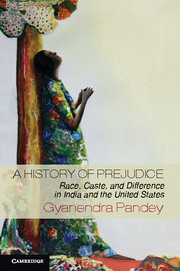5 - An African American Autobiography
Relocating Difference
Published online by Cambridge University Press: 05 February 2013
Summary
In focusing this chapter on the reminiscences of a relatively unknown woman, mother, sharecropper, seamstress, writer, and religious educator from Georgia, Viola Perryman Andrews, who began writing in the era of the civil rights struggle, my purpose is more than simply to document another (“hidden”) aspect of African American history. It is rather to identify two different kinds of history, or perhaps one should say two different perspectives on the history of prejudice and difference, and the attendant matter of civil (civic) rights.
Recall in this context my proposition that the prejudice of the modern requires us to speak in a standard, recognizable idiom, and a standard recognizable manner, to have our words (ourselves?) deemed worthy of attention. I juxtapose an analysis of Viola Andrews's personal account with the analysis of the more public accounts presented in the last chapter precisely because these narratives are constructed very differently and seem at first sight (as I stated in the Introduction) to talk past each other, apparently unable or unwilling to engage one another. In fact, as I shall show, they speak of many of the same issues: of racial privilege and prejudice, of unequal access to resources and opportunities, of the daily struggle to survive and maintain one's dignity. For all that, they speak in rather different voices, with rather different emphases.
- Type
- Chapter
- Information
- A History of PrejudiceRace, Caste, and Difference in India and the United States, pp. 131 - 161Publisher: Cambridge University PressPrint publication year: 2013

